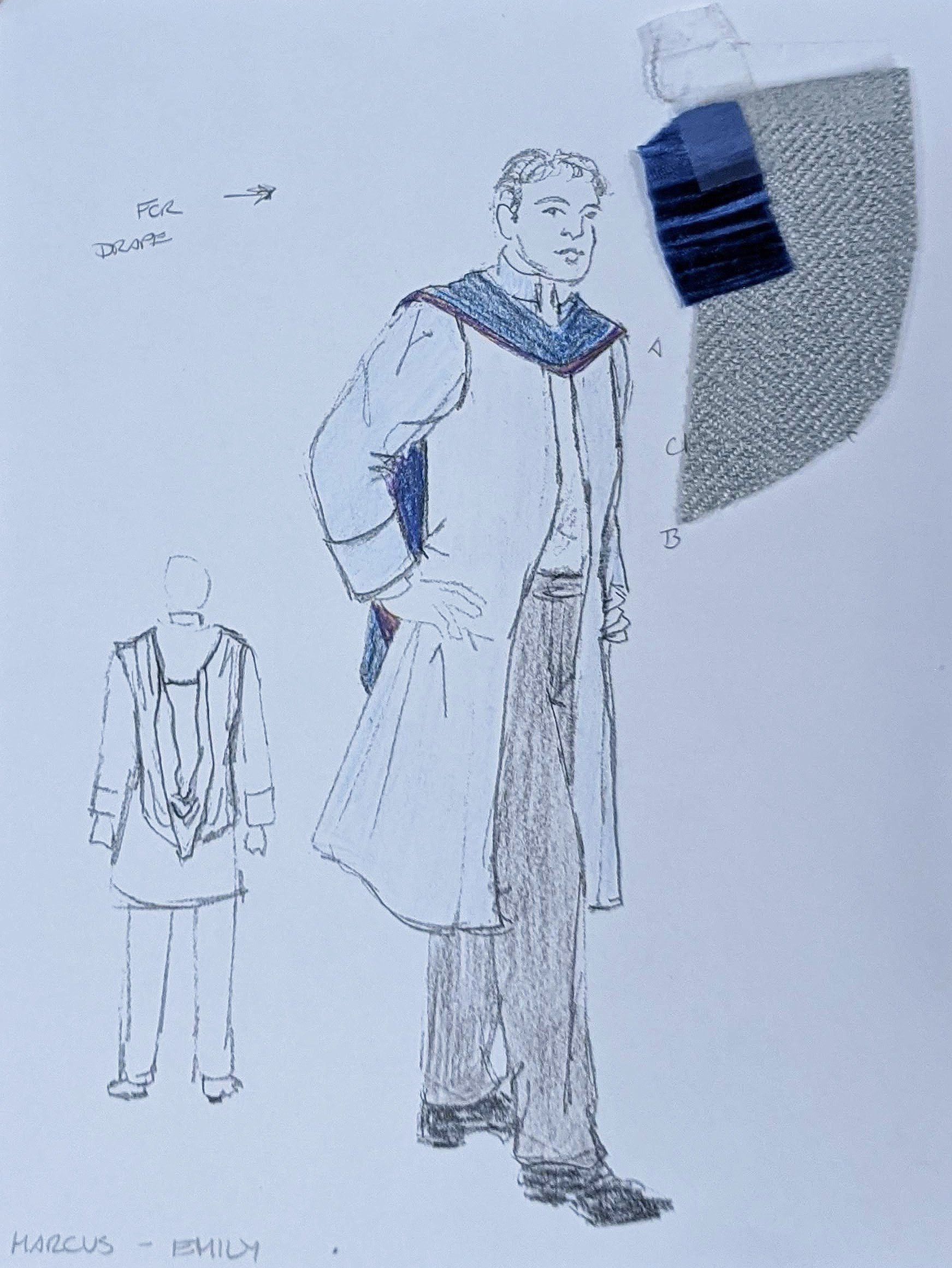Titus Andronicus Directing
and Design
DR. MARTHA SCHMOYER LoMONACO
Director and Producer
Why TITUS Now?
Titus Andronicus,
which premiered in 1594, was one of Shakespeare’s biggest hits, as, if not more popular, than Hamlet, King Lear,
and Macbeth
in its day. The play’s extreme brutality—14 deaths (a record for Shakespeare)—engaged and delighted Elizabethan audiences, who were all too used to blood and violence in daily life and eagerly attended public hangings as free entertainment. For the next 350 years, however, Titus
was Shakespeare’s least produced and most vilified play. It was considered too violent, especially since the violence was performed live on stage (in the much-admired Greek theatre, violence was relayed in words, never witnessed in the flesh), appallingly distasteful, “entertainment” unfit for a polite audience, and simply an exercise in bad taste. The eminent 20th-century poet, T.S. Eliot, summed up the opinions of many when he pronounced Titus
to be "one of the stupidest and most uninspired plays ever written, a play in which it is incredible that Shakespeare had any hand at all.”
Needless to say, neither I nor any member of Theatre Fairfield’s Titus
company agrees; quite the contrary, we feel it is Shakespeare’s most vital play for staging in 2020 since it speaks directly to our time. The 21st century is not unlike the Elizabethan era; we revel in violence, on and off stage, and contemporary moviegoers are all familiar—and very comfortable―with the brutal killings, rape, dismemberments, and tortures that comprise the play’s principal actions.
We have been living in a Titus
moment in the USA and throughout the world. Tyrannical rule that is self-indulgent and power-obsessed is the new normal in governments and corporations. Violent actions—humankind’s inhumanity to
each other and to ourselves—are daily headlines. Vengeance for its own sake and aggressive, unprincipled behaviors are celebrated as a means to right the wrongs people believe have been perpetrated on them by big government, big business, co-workers, neighbors, strangers; many take delight in their cruelties and find strange and bizarre ways to justify their actions. The wanton disregard and disrespect for human beings, played out over and over again on stage, has been sadly reflective of the day-to-day life of people throughout the world―until now. As I write, we are suffering an international health crisis with the rampant spread of coronavirus, which, like the violent actions of this play, is wantonly killing innocent people across the globe. Is this what it takes to stop the brutality exercised by men and women on others, only to be replaced by an equally deadly and unforgiving killer?
Our production of Titus,
like every production of every play, concert, dance, musical, sport, and other public entertainment, has been cancelled as we practice social distancing, quarantine, and government directives to stay home towards defeating COVID-19. We at Theatre Fairfield hope that the state of the world we were capturing and critiquing through our show will cease after this pandemic abates, at a time when we will be forced to reinvent ourselves, our relationships, and how we live in the world. As much as I loved directing this show—and we all loved bringing it to life as an artistic community—we hope that the Titus moment will be gone post-coronavirus. May future productions of Titus
be commentaries on the world of the past, not of the present.
DAN BURKE
Fight Choreographer & Intimacy Coach
Titus Andronicus
is by far William Shakespeare’s bloodiest, most brutal play. According to S. Clark Hulse, the play “has 14 killings, 9 of them on stage, 6 severed members, 1 rape…1 live burial, 1 case of insanity, and 1 of cannibalism – an average of 5.2 atrocities per act, or one for every 97 lines” (Carducci). When Theatre Fairfield decided to tackle a production of this violent play, we enlisted the fabulous fight choreographer and intimacy coach, Dan Burke.
Dan is the founder of Safe Violence and Safe Intimacy by Dan Burke, and has spent 20+ years choreographing fights for theatres, colleges, and high schools in New York, Baltimore, and all over Pennsylvania. In our 2019-2020 season, Dan worked on our production of Fortinbras
by Lee Blessing (d. Mark Torres) and our world premiere of Authenticity (d. Jackob G. Hofmann), written by John Morogiello and based on an idea by Jackob G. Hofmann and John Morogiello. He also taught a 9-week stage combat workshop in the fall semester to prepare the students for our spring production of Titus.
When it came to Titus,
Dan created fights that would use a variety of weapons. While other productions may only use a rapier and/or dagger, our show involved daggers, broadswords, machetes, kukris, and more. Dan’s number one concern when working with our actors was that we always felt safe and comfortable in what we were doing. When coming up with the choreography for the production, Dan would often start by acting it out on his own, and then he would ask a friend and actor to help him in the studio. He would film the fights and then send it to the actors in our production before he would come to rehearsal so that the actors could get familiar with the choreography before they even got on their feet.
Fortunately, Park Lytle (’21), who played Saturninus, was able to record some fabulous footage of the fight choreography in our rehearsals before COVID-19 canceled our production. Check out the video he produced by using the link below!
Check out Dan’s website and Facebook to see more awesome videos and pictures:
Sources Used Above:
Carducci, Jane S. “And I Will Be Revenged on Them All.” The Utah Shakespeare Festival. October 30th, 2015. https://www.bard.org/study-guides/and-i-will-be-revenged-on-them-all
JENNIFER FOSTER
Vocal Coach
According to Jennie Foster, vocal work is an important part of every actor’s ongoing training. Because Shakespeare wrote Titus Andronicus
almost entirely in iambic pentameter, which means there are 5 rhythmic stresses per line, the actors had to develop the skill to allow these rhythms to flow and to balance a natural delivery with heightened, poetic language. Jennie was able to help all of the actors in Titus
achieve this goal through a series of exercises including but not limited to getting the whole body engaged in deep, open and easy breathing, exercises and games to expand the range and free up the vocal inflections, and by exploring the way the voice is amplified by the various resonators in the head and torso.
In our production of Titus Andronicus
there are several female identifying actors who are playing male roles. Because of this, Jennie had to work with actors to help them explore their lower ranges. Jennie says she was really impressed by how courageously they took on this challenge and stepped into a fuller use of their voices in this way. In fact, Jennie says the entire cast of Titus
was courageous throughout rehearsals as they showed willingness to reveal themselves and be vulnerable. Jennie hopes each of the actors take away a greater understanding of how vital it is to speak on the breath, to be open, to be aware of their habits and able to let go of them, to use their whole selves and release their voices into the world - not to force but not to pull back either.
Why you need to start by loving yourself.
Jennifer Foster Feb 2020
Love is the reason you’re here. Love is the reason you are able to be in college getting a wonderful education. Love is the reason you showed up for this audition. Love is the talent that put you in this show. Love is the reason you are devoting many many hours to creating this art with your colleagues. Love cannot run out. It is infinite. So if you are ever tempted to feel small, inadequate, limited in anyway, challenge that suggestion by remembering that you are fueled by love. You are not its source but in fact it is the other way around. You are a ray of light emitting from an unquenchable sun of love. You breathe that love in and you exhale it out. Trust it. Lean on it. Be grateful for it. Share it freely. The more you give the more you will have. Turn all your fears into an opportunity to expand with love and to change all the space around you with that individual version of love that only you can impart. That is the reason you are here and understanding this will make your performance not only a success but an inevitable fulfillment of love’s need to be here as you.
We all know the world needs love. It’s the most glaringly obvious fact in all of our lives. Please know that the efforts you are making to do good work in this show matter. Your
loving willingness to embody the effects of a world without love can point consciousness in the right direction and waken thought from its mindless stupor of hate.
Your effectiveness as performers starts with loving yourselves, it radiates out into your love of your cast and crew mates, the audience, the campus, the wider community, the world. Do not neglect the imperative need to love yourself, to appreciate and mindfully organize your instrument, and to value your voice enough to release it freely into the world that needs so very much to hear what you have to say.
One of the reasons I wrote this is that if you have in your thought a generous desire for everyone in the room to hear every word you say, so much of your work will be done for you. That is an act of love - to provide the intention and life force that enables that to occur. And the thoughtfulness of how you say something so that it is easily understood - that to me is a big part of what voice work is about and I can only continue to encourage you to think about this.
KARL G. RULING
Set Designer
Karl has created a wonderful, extremely functional set with traditions of Japanese theatre design. The hanamichi, commonly found in Kabuki theatre, consists of a raised platform that runs from the back of the theatre and through the audience to connect with the main stage. The set also has a large, table height platform with a series of staircases, and an upper balcony creating an even more multidimensional world for Titus Andronicus.
After making the preliminary floor plan for a set design, Karl likes to make an old-fashioned cardboard replica of the set pieces. This allows him to move pieces around accordingly to see what will work best, which becomes super helpful when modifications have to be made. One of the biggest modifications Karl had to make was lowering the top platform by several feet to avoid the curtain tracks in our Blackbox theatre. While it was not Karl’s original plan for the set to have a lowered platform, it ended up adding fluidity to the set, something that is very important to the director.
JULIE LEAVITT
Costume Designer
Julie Leavitt has created costumes for Titus Andronicus that she describes as “time out of time”; something that can be anytime and also no time. Rather than costuming the actors in contemporary Elizabethan clothing, she has illustrated the rivalry between the Goths and the Romans in her costume designs. The Goths have been described as having a similar style to street wear, while the Romans resemble a more functional regal look. The exception to this theme, however, is Aaron’s costume which, much like his character, falls into neither of these categories. Aside from street wear in general, Julie’s inspiration for the costumes of the Greek’s and the Roman’s was drawn from the Enlightenment and the 18th century, specifically the American Revolution. She compares the functional, regal-ness look of the Romans to the American army’s uniform and the costume like nature of the Goths to the British army’s uniform.
Also, in our production of Titus Andronicus, there are several female identifying actors playing male roles. This is quite opposite of plays in Shakespeare’s day, which was very gender binary, where all of the female roles were played by men in disguise. Julie’s goal when costuming the female actors is not to fool the audience into thinking these women are male, as that has been left to their acting, however the costumes will be hyper masculinized, much like the hypermasculine world that Titus Andronicus is set in.
Julie and the team’s most exciting adventure on the costuming journey was working out how to incorporate blood into the gory production. Titus Andronicus as we know it has the highest body count of characters who die on stage out of any Shakespearian tragedy. With that, Julie’s greatest challenge came from portraying blood without actually using gallons of fake blood. The solution to this was to create what the team calls “blood sashes” which are small pouches filled with yarn, cord, and ribbon in various shades of red and thickness. As a character dies or is wounded on the stage, the content in the pouches will be released in a spattering, flowing motion.
Lynne Chase has taken the emotional extremity of Titus Andronicus and has replicated it in her lighting designs for the show. This was not a linear process for Lynne, however, since sometimes ideas that she has change with director’s input. Often times after attending rehearsals, Lynne will junk ideas she had after realizing it will not work with what the actors are doing on stage, but she also will be inspired for new ideas as well.
A particular lighting moment that stands out to her is in scenes set in the grave. Here the audience will experience a sharp downlight creating a spooky feeling of light from below.
Lighting Design, which is so dependent on all other elements of production, is the last to be realized; Lynne's final design was not due until after the production was cancelled. Nevertheless, we know it would have been fabulous!




























